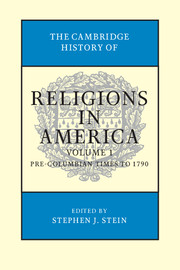Book contents
- Frontmatter
- Contents
- Contributors
- Editor's Introduction
- SECTION I BACKGROUND ON RELIGIOUS TRADITIONS – PRE-1500S
- SECTION II RELIGIONS IN THE POST-COLUMBIAN NEW WORLD – 1500–1680S
- SECTION III RELIGIOUS PATTERNS IN COLONIAL AMERICA – 1680S–1730S
- SECTION IV RELIGIOUS DIVERSITY IN BRITISH AMERICA – 1730S–1790
- SECTION V AMERICAN RELIGIONS IN THE EIGHTEENTH-CENTURY INTERNATIONAL CONTEXT
- SECTION VI THEMATIC ESSAYS
- Index
Editor's Introduction
Published online by Cambridge University Press: 28 July 2012
- Frontmatter
- Contents
- Contributors
- Editor's Introduction
- SECTION I BACKGROUND ON RELIGIOUS TRADITIONS – PRE-1500S
- SECTION II RELIGIONS IN THE POST-COLUMBIAN NEW WORLD – 1500–1680S
- SECTION III RELIGIOUS PATTERNS IN COLONIAL AMERICA – 1680S–1730S
- SECTION IV RELIGIOUS DIVERSITY IN BRITISH AMERICA – 1730S–1790
- SECTION V AMERICAN RELIGIONS IN THE EIGHTEENTH-CENTURY INTERNATIONAL CONTEXT
- SECTION VI THEMATIC ESSAYS
- Index
Summary
The history of American religions does not begin on the North American continent. On the contrary, it is a complex tale of the transplantation, interaction, and transformation of diverse imported religious traditions that hailed from a host of geographical locations on the Asian, European, and African continents alongside new religious movements that arose in the context of the Americas. This complexity creates a challenge for all who wish to understand the religious world in the United States, which is an astonishingly diverse, complex, and powerful reality in the opening decades of the twenty-fi rst century. What follows is an anticipation of some of the insights that authors of the essays in this fi rst volume of The Cambridge History of Religions in America provide regarding the early history of American religions.
Native American religions, for example, scattered across the full expanse of the American continent, functioned centrally for their adherents many centuries prior to European exploration and colonization in the New World. Native Americans came from elsewhere too, namely, from Asia. The continuities between Native American and Asian religious traditions were evident in the spiritualities manifest in tribal rituals at sacred sites as well as in the organization of daily life. The role of the shaman also was central in transformative rites, accessing diverse spiritual powers for both individuals and tribes.
In the Iroquoian religion, which existed for more than fi ve thousand years in the Northeast Woodlands, the tradition of ceremonial dance was a means of achieving diverse ends, from healing, to success in the hunt, to victory in war. Spirits and spiritual forces were evident in soul travel and in dreams. Mississippian religious traditions, present in the Midwest and Southeast after 1000 c.e., involved a complex cosmology in which there were diverse deities, including Earth Mother , a female life-giving force. Mississippian shamans gained access to power by fasting and visions.
- Type
- Chapter
- Information
- The Cambridge History of Religions in America , pp. xiii - xxPublisher: Cambridge University PressPrint publication year: 2000

